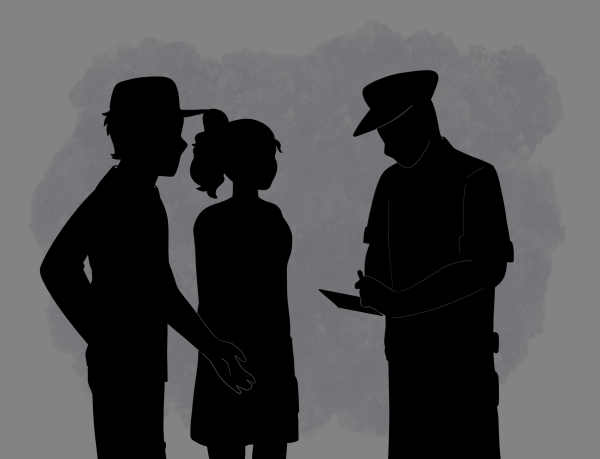For the first few Saturdays of the semester, students are primped and prepared to hit Isaacs Street and track down the most recent posting on the Instagram account @whittiesbluesclues, often to find their peers already fleeing the party in droves with the Walla Walla Police Department (WWPD) having already arrived.

Students are at a loss, especially those who experienced the Whitman party scene in previous years. Freshman and Walla Walla local, Chloe Busch, expressed similar sentiments.
“I know in the past there have definitely been a lot of parties in the same house with the same noise level that cops haven’t, or even Whitman Security hasn’t shown up for,” Busch said.
Club Noir, a newly formed student DJ collective, has recently hosted some off-campus parties, a few of which have been shut down by police. Their co-founder Aizayah James spoke with the police after attending the “Responsible Partying Information Session” that was held downstairs in Reid on Wednesday, Sept. 25.
The poster read “Please join Whitman Security and the Walla Walla Police Department in discussing safe practices when hosting and attending parties.”
“There were six people there,” James said. “They were throwing shots a little bit. They brought up the [Black Party] that we had. They were like, … ‘everybody there’s pretty respectful but it just gets too wild’… Too many complaints coming from neighbors, too many people in the street. Things like that. They said that we can’t be outside of the houses talking too loud. So if there’s people outside of the house, they can’t talk too loud, or you get a call for that too.”
The other two co-founders of Club Noir were contacted by Whitman Security for a meeting. Co-founder Emmanuel Sakala, who attended the meeting, told The Wire how it went.
“They have a good working relationship with the police, and we weren’t in trouble; they just wanted us to make sure that in as much as we want to have fun on weekends, we also are respecting the community, and they wanted us to be safe,” Sakala said.
“It’s not really even noise,” James said. “It’s once the party overflows to the street; that’s when I know, ‘Okay, the police are going to show up.’”
Still, many have observed a difference in the way the police and Whitman Security have been handling the Whitman party scene this semester.
“I know this year, two weeks ago there was a Love Brunch show at Fiji. There was barely anyone there…Whitman Security [showed] up to that one, and they said, ‘you’re getting noise complaints; you need to be quiet.’ So, that was a little weird. Seeing how many people are calling in noise complaints this year, I can’t understand what difference there is in the students this year to make people do that,” Busch said.
Some of the incidents that occurred at Whitman parties last year may be having negative consequences for today’s partygoers.
“There was a case of a girl who wasn’t old enough to be at the party, but due to the lack of security, she just walked in there. Her mom came in and was like, ‘Where’s my daughter?’ and called the police,” James said.
In an interview with The Wire, WWPD Administrative Sergeant Nick Loudermilk addressed the reason for police presence at these parties.
“This is pretty normal for this time of year, in the ten years that I’ve been here. . . If I asked some of the officers that have been here 25/30 years, they’d say the same thing. It’s based on everybody coming back to school. There’s probably an uptick in calls, but that’s just because people are coming back to school,” Loudermilk said.
Loudermilk emphasized that law enforcement’s goal is to resolve problems at the lowest level, aiming for peaceful resolutions rather than escalating the situation. They prefer to show up, ask partygoers to lower the noise, and only repeated complaints or unsafe situations may require further action.
“All we ask for is that if we show up, we’re going to give respect, we’d like to get respect back. We’re trying to make peace in the neighborhood… If we get there, we’re just asking people to be… respectful to their neighbors, turn the music down, and be safe. We don’t want to cite anybody; we don’t want to take people to jail,” Loudermilk said.
Amidst all the speculation as to why Whitman parties have been getting abnormal amounts of police attention this semester, the Club Noir founders remain hopeful.
“Last week on Friday, we had the 2010s party at Troy and the police didn’t come, it wasn’t shut down, there were no noise complaints. That is because, as Club Noir, we put in more measures to make sure we didn’t get shut down. We kept the front door locked; everyone had to come through the back,” Sakala said. “Going forward, you know, we’re students… so there’s a learning curve. Us getting shut down twice was a learning experience. We’re still learning, and we’re going to try to have safe parties where we don’t get shut down.”
James noted some ways that partygoers can reduce the risk of shutting down.
“Stay off the street. Stay off the yard. If you don’t like being inside, stay on the porch… I’m not going to say ‘don’t party as hard’ because it’s a party. Respect the property. When the police come, stay in the yard; don’t go talk to the police. If you don’t live in the house, don’t talk to the police… Just continue to talk and socialize, quiet down a little bit, and when they leave, we can start it right back up,” James said.
As Whitman students navigate the learning curve of hosting parties, Club Noir’s founders remain committed to creating safe, fun environments without police intervention. In the future, a focus on respectful behavior and smart precautions can allow for community responsibility, proving that good times don’t have to come at the cost of getting shut down.




